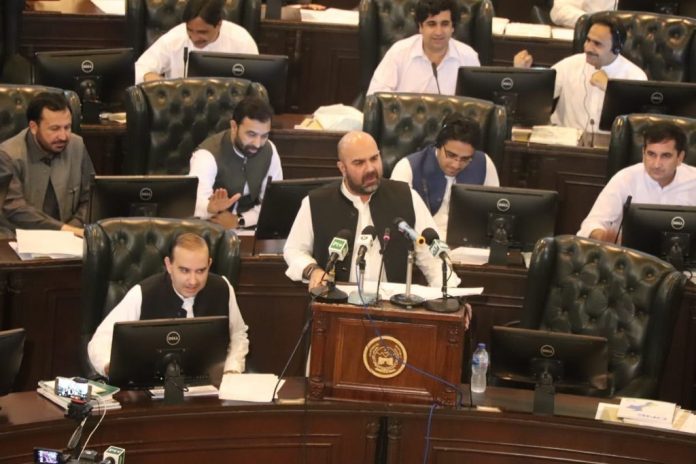- 12 per cent reduction in KP cabinet members’ salaries
PESHAWAR: Khyber Pakhtunkhwa (KP) Finance Minister Taimur Khan Jhagra on Tuesday presented the provincial budget 2019-20, with Rs900 billion tax-free surplus budget.
The provincial finance minister presented the annual budget in the KP Assembly amid uproar by the opposition benches that were protesting the non-issuance of a production order for former president Asif Ali Zardari who in the National Accountability Bureau’s (NAB) custody in a corruption case.
Giving a breakup of the revenue, he said that the total revenue for the fiscal year 2019-20 would be Rs900 billion, including Rs453.2 billion from Federal Tax Assignments (FTA), Rs54.5 billion, one percent from divisible pool under the head of war on terror, Rs25.6 billion from oil and gas royalty and surcharges, Rs21.2 billion from net profit of power generation, Rs34.5 billion from NHP, Rs53.4 billion from provincial taxes and non-taxes, Rs82 billion from Foreign Projects Assistance, Rs151 billion grant for tribal districts, and Rs24.7 billion from other miscellaneous sources.
The outlay includes Rs319 billion for annual development plans (ADP), promising fast pace development of the province with record allocations.
It was further explained that out of the total budget outlay, Rs693 billion have been allocated for the old districts and Rs162 billion have been allocated for the recently merged districts of the province, showing a surplus of Rs45 billion.
“The KP government has also set Rs53.4 billion target for Khyber Pakhtunkhwa Revenue Authority (KPRA) for the fiscal year 2019-20 making it 54 per cent more than the performance of this year,” said Jhagra.
He emphasised that it was through austerity that the government had saved Rs95 billion during the outgoing fiscal year and this had enabled the enhancement of the province’s development programme making it possible for KP to be at par with other developed provinces sooner than later.
The minister announced a five per cent ad-hoc relief in the salaries of employees from BPS-17 to BPS- 19 and ten per cent relief for employees from BPS-16 and below, while adding that there would be a 12 per cent reduction in the salaries of cabinet members and due to the country’s ongoing tough economic condition, the government was not in the position to increase salaries of employees of BPS-20 to BPS 21.
“Similarly, salaries of civil servants posted against positions with additional allowance will also not be increased,” he added.
He said that the government would take the revenue target to Rs100 billion by 2023, which would be three times higher than the current revenue of the province, adding that the revenue generation would be tax based.
In this regard, provincial income taxes are being increased for the current fiscal year.
This requires individuals with a monthly income of as low as Rs10,001 to Rs20,000 to pay Rs330 per month. Similarly, individuals earning Rs20,000 to Rs30,000 are to pay Rs1,000 per month; individuals earning between Rs30,000 to Rs50,000 are to pay Rs1,200 per month, individuals earning Rs50,000 to Rs100,000 will have to pay Rs1,500 per month whereas, proposed taxes for individuals earning Rs100,000 to Rs200,000, Rs200,001 to half a million rupees and those earning more than Rs0.5m are Rs2,000, Rs3,000 and Rs5,000 respectively.
For employees working in the public sector, zero taxation has been proposed for grade one to six employees of the provincial government while government employees of grade seven to 12 would be liable to pay a tax of Rs1,000 per month, those of grade 13 to 17 would be liable to pay a tax of Rs1,500 tax per month and those of grade 18, grade 19 and grade 20 would pay taxes of Rs1,800, Rs2,000, and Rs3,000 respectively.
“The government has actually reduced various taxes in the proposed budget. Out of 58 taxable services of the Khyber Pakhtunkhwa Revenue Authority (KPRA), the government has reduced 28 taxes below the 15 per cent standard tax rates for restaurants, marriage halls, property dealers, electronic media, call centres, beauty parlours, gyms, ride-hailing services and etc.,” Jhagra said.
“Similarly, the government has also reduced taxes and fee on sectors where ever it was deemed necessary. In the transport sector, the government has proposed a reduction of fee and bringing it at par with Punjab,” he added.
Furthermore, Rs24 billion have been allocated for 17,000 vacant posts and regularisation of the Khasadar force and levies.
The provincial finance minister expressed his happiness that the KP government had fulfilled its promise of providing Rs11 billion and the federal government had provided Rs72 billion and the pledge of providing 3 per cent of the National Finance Commission (NFC) to newly merged tribal districts has been implements and fulfilled as promised.
He also thanked armed forces who voluntarily reduced their budget and included their share in the development of tribal districts which, he said, was the real spirit and identity of Pakistan.




